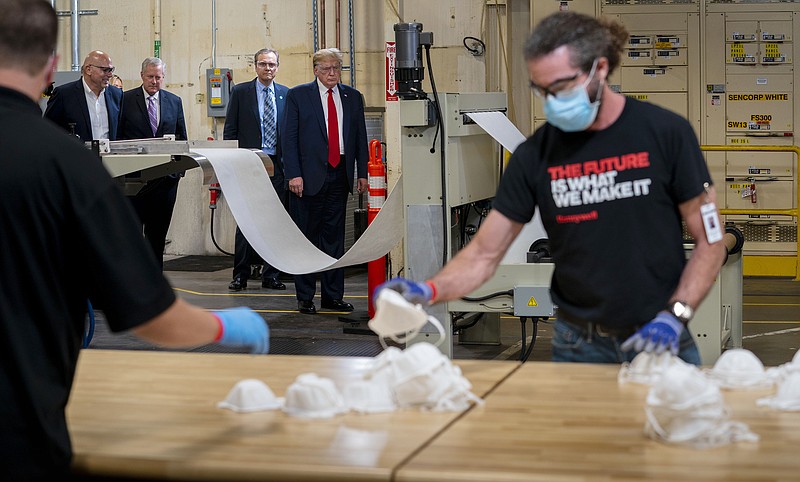Don't even think of complaining about COVID-19 fatigue. We're nowhere near yet any semblance of the novel coronavirus fatigue - from politics to 24-hour news coverage to personal worries - we're unfortunately likely to know.
On Monday morning, the 1.3 million U.S. cases of COVID-19 made up nearly a third of the entire world's 4.1 million cases. We have 32.2% of all global cases; the U.S. population is 4.2% of the global population.
Last week, we learned that Donald Trump's valet tested positive for the novel coronavirus, as did Vice President Mike Pence's press secretary - who also happens to be the wife of top Trump adviser Stephen Miller.
Likewise, top health officials who've been part of the White House virus briefings with Trump are self-quarantining, while Pence is self-isolating, though the health folks still plan to be part of Sen. Lamar Alexander's live-streamed, teleconferenced congressional hearing about the public health crisis at 10 a.m. today. Sen. Alexander, too, is self-quarantining after a member of his staff tested positive.
The Washington Post reports several members of the Secret Service have tested positive, helping us now understand other reports last week that Trump was wearing a mask around the Secret Service. Yet we also recall another news story and accompanying photo of Donald Trump and his entourage touring a mask factory while not wearing masks. Will all those workers then busily making masks now have to stay home and self-isolate?
If so, it wouldn't be the first time our president and his administration delayed the fight against COVID-19.
In fact, in the early days of the pandemic, the U.S. government turned down an offer to make millions of N95 masks in America, according to a report in The Post on Sunday. In late January, Michael Bowen's Texas-based Prestige Ameritech was already receiving orders from as far away as Hong Kong. He knew his company could ramp up production to make an additional 1.7 million masks a week, and he viewed the shrinking domestic production of medical masks as a national security issue. He wanted to give our federal government first dibs.
"We still have four like-new N95 manufacturing lines," he emailed on Jan. 22 to top administrators in the Department of Health and Human Services. "Reactivating these machines would be very difficult and very expensive but could be achieved in a dire situation."
The federal response: "I don't believe we as an government are anywhere near answering those questions for you yet," the HHS director of the Division of Critical Infrastructure Protection emailed on the same day.
Bowen, the next day, wrote back: ""We are the last major domestic mask company. ... "My phones are ringing now, so I don't 'need' government business. I'm just letting you know that I can help you preserve our infrastructure if things ever get really bad. I'm a patriot first, businessman second."
The Post reported, "In the end, the government did not take Bowen up on his offer. Even today, production lines that could be making more than 7 million masks a month sit dormant."
Bowen's overture was described briefly in an 89-page whistleblower complaint filed last week by Rick Bright, former director of the Biomedical Advanced Research and Development Authority. Bright alleges he was retaliated against by Health and Human Services officials - including being reassigned to a lesser post - because he tried to "prioritize science and safety over political expediency." HHS has disputed his allegations.
Despite President Trump's claim last week that COVID-19 will go away without a vaccine, Dr. Tom Inglesby, director of the Center for Health Security at the Johns Hopkins Bloomberg School of Public Health, said on Fox News Sunday that the claim is wrong.
"No, this virus isn't going to go away. Hopefully, over time, we'll learn to live with it and we'll be able to reduce the risk of transmission. But it's going to stay as a background problem in the country and around the world until we have a vaccine."
Inglesby stressed that the nation still does not have sufficient testing or contact tracing, and as businesses reopen and Americans start to resume "increased social interaction, we will again see increased transmission and rising number of cases."
Americans are noticing the disconnect between the Trump administration virus response and the pandemic we still see growing daily. Many news outlets on Sunday and Monday included stories about the fallout seriously worrying Republicans about November elections.
The Post's commentator, E.J. Dionne, penned a piece headlined, "Why the GOP may lose everything." Issues that were once "percolating for many" are now "personal for everyone," he wrote. "Having disastrously bungled the pandemic, Trump is not only falling well behind former vice president Joe Biden in the polls; he could also be creating a tidal wave that would give Democrats unified control of the federal government's elected branches."
As for Biden, he penned his own piece in The Post, accusing Trump of offering Americans "a false choice" between protecting people's health and reviving the economy.
"It's been more than two months since Trump claimed that 'anybody that wants a test can get a test,'" Biden writes. "It was a baldfaced lie when he said it, and it still isn't remotely true. If we're going to have thriving workplaces, restaurants, stores and parks, we need widespread testing. Trump can't seem to provide it - to say nothing of worker safety protocols, consistent health guidelines or clear federal leadership to coordinate a responsible reopening."
COVID-19 fatigue? We ain't seen nothing yet.
